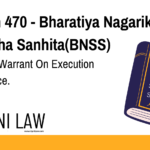Code
(1) When any person has been sentenced to punishment for an offence, the
appropriate Government may, at any time, without conditions or upon any conditions which
the person sentenced accepts, suspend the execution of his sentence or remit the whole or
any part of the punishment to which he has been sentenced.
(2) Whenever an application is made to the appropriate Government for the suspension
or remission of a sentence, the appropriate Government may require the presiding Judge of
the Court before or by which the conviction was had or confirmed, to state his opinion as to
whether the application should be granted or refused, together with his reasons for such
opinion and also to forward with the statement of such opinion a certified copy of the
record of the trial or of such record thereof as exists.
(3) If any condition on which a sentence has been suspended or remitted is, in the
opinion of the appropriate Government, not fulfilled, the appropriate Government may cancel
the suspension or remission, and thereupon the person in whose favour the sentence has
been suspended or remitted may, if at large, be arrested by any police officer, without
warrant and remanded to undergo the unexpired portion of the sentence.
(4) The condition on which a sentence is suspended or remitted under this section
may be one to be fulfilled by the person in whose favour the sentence is suspended or
remitted, or one independent of his will.
(5) The appropriate Government may, by general rules or special orders, give directions
as to the suspension of sentences and the conditions on which petitions should be presented
and dealt with:
Provided that in the case of any sentence (other than a sentence of fine) passed on a
person above the age of eighteen years, no such petition by the person sentenced or by
any other person on his behalf shall be entertained, unless the person sentenced is in jail,
and—
(a) where such petition is made by the person sentenced, it is presented through
the officer in charge of the jail; or
(b) where such petition is made by any other person, it contains a declaration
that the person sentenced is in jail.
(6) The provisions of the above sub-sections shall also apply to any order passed by
a Criminal Court under any section of this Sanhita or of any other law, which restricts the
liberty of any person or imposes any liability upon him or his property.
(7) In this section and in section 474, the expression “appropriate Government”
means,—
(a) in cases where the sentence is for an offence against, or the order referred to
in sub-section (6) is passed under, any law relating to a matter to which the executive
power of the Union extends, the Central Government;
(b) in other cases, the Government of the State within which the offender is
sentenced or the said order is passed.
Explanation of Section 473 BNSS
Section 473 BNSS empowers the Central or State Government to suspend or remit a sentence, meaning they can reduce, alter, or cancel the punishment of a convicted person.
Key Points:
- The remission may be conditional or unconditional.
- If a convict applies for remission, the Government may consult the Judge who passed the sentence.
- If the convict violates the remission conditions, the Government can revoke the remission, and they will have to serve the remaining sentence.
- The power applies not only to imprisonment but also to any restriction on liberty or financial liability.
👉 Related Section: Section 474 BNSS – Procedure for Suspended or Remitted Sentences
Illustration (Example Scenarios)
Example 1: Early Release for Good Conduct
Raj is serving five years in jail for theft. After three years, he applies for sentence remission due to good behavior. The State Government, after reviewing his case and consulting the Judge, decides to reduce his sentence by one year, allowing him to be released earlier.
Example 2: Revocation of Suspended Sentence
Ankit was granted sentence remission under the condition that he would not commit any crimes for the next two years. However, he was later caught in another offense. The Government revoked his remission, and he was arrested to serve the remaining sentence.
Common Questions (FAQs)
Q1: Who has the power to suspend or remit a sentence under BNSS?
👉 Answer: The Central Government (for Union offenses) and the State Government (for State offenses).
Q2: Can the remission be revoked once granted?
👉 Answer: Yes. If the convict violates the conditions, the remission may be canceled, and they must serve the remaining sentence.
Q3: Does this law apply only to jail sentences?
👉 Answer: No. It applies to any form of punishment, including fines or restrictions on liberty.
Q4: Can a convict apply for remission while being out of jail?
👉 Answer: No. The convict must be in jail to apply for remission, unless it is a fine-related sentence.
Q5: How does the Government decide on remission?
👉 Answer: The Government may consult the Judge who passed the sentence, reviewing the case records before making a decision.
Conclusion
Section 473 BNSS provides an important legal framework for sentence remission and suspension, ensuring that punishments remain fair and adaptable. However, remission is not an automatic right—it depends on government discretion and adherence to conditions.
🔹 Key Takeaways:
- The Government can remit or suspend a sentence.
- A convict must apply for remission while in jail.
- Remission may be revoked if conditions are violated.
- It applies to all criminal penalties, not just imprisonment.
For more details on BNSS legal provisions, visit ApniLaw – your trusted legal resource. ✅








